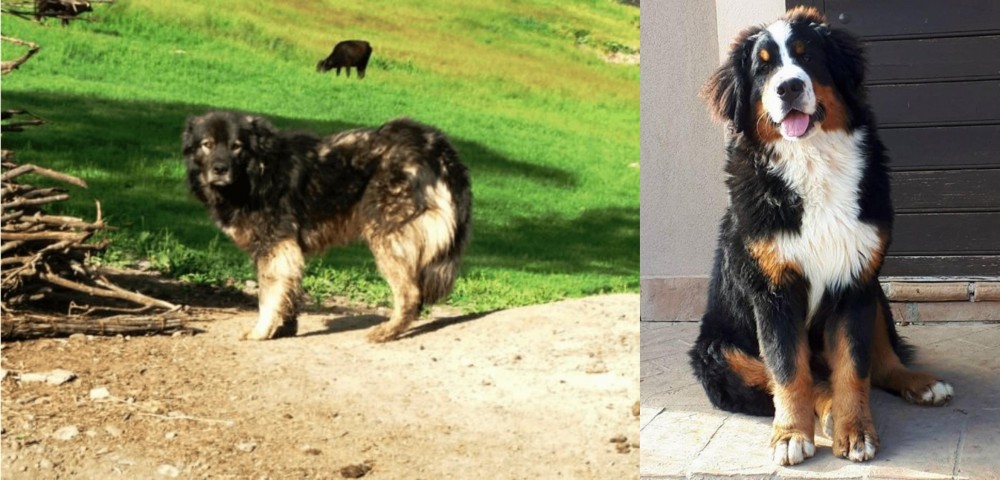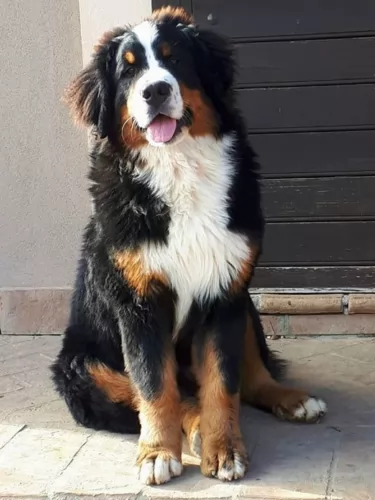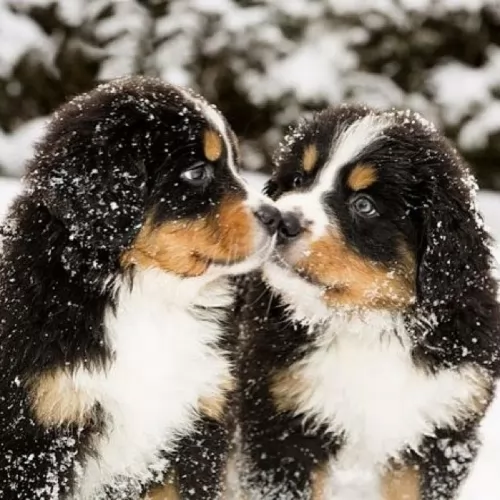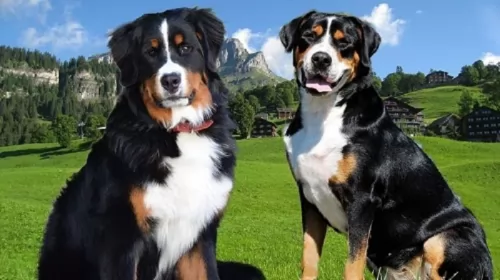 Petzlover
Petzlover Kars Dog is originated from Turkey but Mountain Burmese is originated from Myanmar. Kars Dog may grow 19 cm / 8 inches higher than Mountain Burmese. Kars Dog may weigh 11 kg / 25 pounds more than Mountain Burmese. Kars Dog may live 4 years more than Mountain Burmese. Both Kars Dog and Mountain Burmese has almost same litter size. Kars Dog requires Moderate Maintenance. But Mountain Burmese requires Low Maintenance
Kars Dog is originated from Turkey but Mountain Burmese is originated from Myanmar. Kars Dog may grow 19 cm / 8 inches higher than Mountain Burmese. Kars Dog may weigh 11 kg / 25 pounds more than Mountain Burmese. Kars Dog may live 4 years more than Mountain Burmese. Both Kars Dog and Mountain Burmese has almost same litter size. Kars Dog requires Moderate Maintenance. But Mountain Burmese requires Low Maintenance
 The Kars Dog is found in Turkey, hailing more specifically from the Kars province, after which it is named. He actually has a long history of at least 600 years.
The Kars Dog is found in Turkey, hailing more specifically from the Kars province, after which it is named. He actually has a long history of at least 600 years.
Referred to as a Molosser, the dog is still used to this day for shepherding livestock. There are many varieties and sizes of the dog, with the most common Kars type being similar to the Nagazi variant of the Caucasian Shepherd Dog.
 The Burmese Mountain Dog is quite often taken to be the Bernese Mountain Dog, a Swiss farm dog. However, the Burmese Mountain Dog comes not from Switzerland but from Myanmar and Burma. The Burmese was bred to hunt skunks and guard livestock for the northern tribesman of Myanmar. The way they hunted for the aggravating skunks was to hide themselves in the underbrush and wait for the skunk to go by. Their facial markings confuse skunks when they see him in the bush with a black and white face. At the same time, his rust color lets the hunter know he is the dog not the skunk.
The Burmese Mountain Dog is quite often taken to be the Bernese Mountain Dog, a Swiss farm dog. However, the Burmese Mountain Dog comes not from Switzerland but from Myanmar and Burma. The Burmese was bred to hunt skunks and guard livestock for the northern tribesman of Myanmar. The way they hunted for the aggravating skunks was to hide themselves in the underbrush and wait for the skunk to go by. Their facial markings confuse skunks when they see him in the bush with a black and white face. At the same time, his rust color lets the hunter know he is the dog not the skunk.
The Mountain Burmese is an incredible athlete despite the size. They are agile. They are quick. They can climb trees – as many as fifty feet while chasing a skunk. They also make a great companion and love to be a family dog. They are calm and gentle as an adult and great with kids. They are easily trained but remember they can climb trees. However, they do not do well with cats that are black and white or solid black because they confuse them with the skunk prey.
 Large and heavy, the Kars Dog is strong, with a large head and broad chest. The height of the dog at the withers is 60 to 90cm and he weighs in at roughly 60 - 80kg.
Large and heavy, the Kars Dog is strong, with a large head and broad chest. The height of the dog at the withers is 60 to 90cm and he weighs in at roughly 60 - 80kg.
At one time the ears were cropped but they are left these days and then they are of medium length and floppy. The coat varies too in terms of length and color - short to longer variety coats. The coat can be a solid color or it can have patterns. You’ll find reddish brown dogs, grey and black dogs as well as dogs with a mix of colors.
The Kars is an aggressive, territorial dog, but with the correct training, socialization and upbringing, it can be a loving, amicable family pet.
Known also as the Kars Turkish Shepherd or Kars shepherd, he makes an ideal guarding dog as he is brave and devoted to those he is protecting. He is cautious and even unfriendly towards people he doesn’t know, and it is thought that because of his robustness, it might not be a good idea to leave him unsupervised with small children.
Nonetheless with training and socialization, the Kars is capable of being a super pet for all members of the family. Training him won’t be that easy as he is large and strong-willed, but the training will provide him with some basic good manners.
He will require a firm, confident owner and will require living in a home with a big garden or in the countryside as he requires a good amount of exercise.
 The Mountain Burmese Dog is a large, sturdy, well built and athletic canine. Strong and well balanced, he is agile and athletic when it comes to the work, he has to do in chasing skunks. He has a full body with a large head and dark, oval eyes. The Burmese has triangular ears close to his head and medium in size. With a flat, broad skull the muzzle is straight and strong. They have black noses and a scissors bite, on their muscular, strong neck. With a deep chest and broad back, they have strong ribs. Finally, the tail is bushy, long and hangs low.
The Mountain Burmese Dog is a large, sturdy, well built and athletic canine. Strong and well balanced, he is agile and athletic when it comes to the work, he has to do in chasing skunks. He has a full body with a large head and dark, oval eyes. The Burmese has triangular ears close to his head and medium in size. With a flat, broad skull the muzzle is straight and strong. They have black noses and a scissors bite, on their muscular, strong neck. With a deep chest and broad back, they have strong ribs. Finally, the tail is bushy, long and hangs low.
 The Kars is a large dog and because of his past where he used to guard livestock, he is a dog used to wide open spaces. He will require a home with a good sized garden and a family who exercises him frequently.
The Kars is a large dog and because of his past where he used to guard livestock, he is a dog used to wide open spaces. He will require a home with a good sized garden and a family who exercises him frequently.
With the right kind of care, the Kars is able to strongly bond with his human family, taking his role as guardian and protector very well. He is alert and smart and that is why he will need training and socialization and a firm, fair human owner. He will then become a loving, devoted companion.
 The Kars is generally healthy and long-lived, being able to reach 12 years of age with ease if cared for properly. Every dog, even the most healthiest ones, will have some health issues, and with a large dog like this, it is hip dysplasia, obesity, cancer and heart problems.
The Kars is generally healthy and long-lived, being able to reach 12 years of age with ease if cared for properly. Every dog, even the most healthiest ones, will have some health issues, and with a large dog like this, it is hip dysplasia, obesity, cancer and heart problems.
Coughing is a symptom of different illnesses, with one of them being heart disease. If your dog is still coughing after several days, its time to see the vet.
When your dog hasn’t exercised, you’ll see him battling to breathe or the breathing will be rapid. He’ll be reluctant to walk and play too and may be disinterested in his food. Edema, the swelling of body tissues is also a sign of heart disease.
 The kind of health issues that most large or giant dogs have to deal with are some of the same things that this breed dealt with.
The kind of health issues that most large or giant dogs have to deal with are some of the same things that this breed dealt with.
 Your Kars dog can be a wonderful addition to your home, but you need to know how to care for a big dog before you get carried away and add a large puppy breed to your family.
Your Kars dog can be a wonderful addition to your home, but you need to know how to care for a big dog before you get carried away and add a large puppy breed to your family.
Too many people buy a cute bundle of fur and get rid of it when he is no longer a cute puppy. Before you bring a giant breed dog into your home, take note of some useful tips to keep him in tip top condition -
If you bring a puppy home, he’ll need to be fed 4 times a day with special puppy food. There are excellent commercially manufactured puppy foods on the market and you will need to get the one that caters for ‘large- or giant puppy breeds’, as the Kars is a very big dog.
As your dog reaches adulthood you’ll feed him less. If in any doubt as to the kind of food to give your dog to maintain good health, speak to your vet.
Every dog will need exercise to keep him trim and fit but to also stimulate their minds. Providing your Kars dog with exercise such as walks and ball games will also ensure he doesn’t become bored.
Your pet will need a nice quiet, warm, dry place to sleep and rest. If he is an outdoor dog during the day, make sure that he has a place to rest in the shade. Make sure he has a non-stop supply of fresh, cool water too that is placed in a cool, reachable spot.
Your large pet is an average shedder and to keep his thick coat in tip top condition, you want to be sure to brush him at least twice a week.
 Feed a high quality dog food designed for large or giant puppies. Feed 3times a day 2.5 times for puppies and go easy on the treats
Feed a high quality dog food designed for large or giant puppies. Feed 3times a day 2.5 times for puppies and go easy on the treats
There is a definite tendency for these dogs to become obese. Don’t overfeed. Don’t free feed. Large breed high quality dog food should be fed 2 times a day and go easy on the treats. Watch his weight.
strength, stamina
The breed is definitely athletic and active. They love to chase and take long walks daily. They need a large yard but be careful as they can climb trees and your fence. They are great companions when backpacking and camping. If there are skunks in the area however watch out! These are hunting dogs despite their size and they would do very well in barn hunt and field trials.